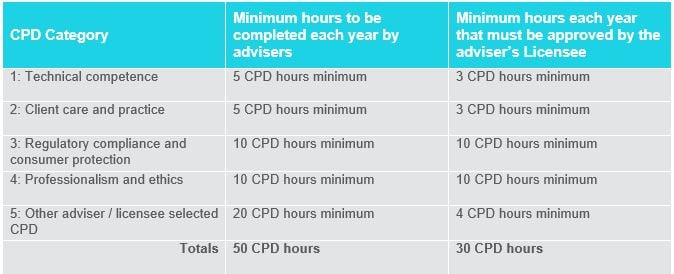On 24 July 2018, the Financial Adviser Standards and Ethics Authority (FASEA) released Consultation Paper 6: Continuing Professional Development (CPD).
The consultation paper provides guidance on the Professional Development Program that FASEA expects all financial advisers maintain – including the minimum number of hours devoted to completing CPD – as well as clarifying the Licensee’s obligations and how CPD will be accredited.
The consultation paper sets out the responsibilities, due to commence from 1 January 2019, as follows:
Proposed adviser responsibilities
- CPD hours
An hours-based system of CPD calculation has been adopted by FASEA “to encourage a wide variety of education activities within the required competencies and professionalism”. Under FASEA’s proposed standard, financial advisers must complete at least 50 hours of CPD activity in each CPD Year, provided:
- 70% of CPD completed is approved by the adviser’s Licensee, and
- The CPD activities completed cover the following knowledge area requirements:
- CPD Records
Advisers must also:
- maintain a continuous, up-to-date and accurate record of their CPD activities, including evidence of any completed CPD activity that is intended to be relied on to meet the standard,
- keep records for six years from the end of each CPD year, and
- provide those records to the Licensee in order for the Licensee to meet their compliance with the CPD year requirements.
FASEA has also proposed that advisers may maintain on a continuing basis a Professional Development Plan that:
- identifies areas for improvement in competence, knowledge and skills, and
- sets out proposals for how those areas will be improved.
FASEA has sought feedback on whether it should provide resources and templates, such as a CPD Activity Report as a guide for recording CPD completion and a resource on developing a Professional Development Plan.
- CPD types
FASEA says that “education that is measurable, appropriately assessed and leads to further qualification outcomes for participants is preferred because it more likely provides structured and independent results for the participant’s work and training records.” FASEA proposes that Licensees and advisers may consider the following types of CPD be undertaken.
a. Formal relevant education (provided by a FASEA-approved Education Provider) may contribute – to a maximum of 25 CPD hours per year – to the CPD requirement including:
- degree equivalent study to meet legislative requirements (such as bridging courses and approved degree studies), and
- any formal study towards other qualifications and designations relevant to the practice of the adviser.
b. Non-formal education including:
- Education for the purposes of achieving a relevant professional designation (e.g. CFP, FCHFP, etc),
- Education for the purposes of meeting requirements in specific financial advice provisions (e.g. Stock Broking, SMSF, Aged Care, etc.), and
- Education for the purposes of accreditation in specific forms of financial products relevant to licensing arrangements (e.g. Credit)
c. Other CPD:
- Sessions / Workshops at conferences, PD days, update sessions, etc. (financial advice relevant) – approved CPD,
- Sessions / Workshops at conferences, PD days, update sessions, etc. (non-financial advice relevant) – non-approved CPD, and
- Professional or Technical Reading – to a maximum of 7.5 hours if approved by the Licensee as relevant to providing financial advice.
Proposed Licensee responsibilities
FASEA proposes that each Licensee must maintain and publish a CPD policy that its authorised advisers adhere to and which covers the Licensee’s:
- Overall approach to CPD,
- Process for approving CPD activities and the mechanism for allocating hours to these,
- Approach to any professional development plans for advisers,
- Process for ensuring CPD activities are provided by persons and/or entities that are appropriate (with sufficient standing, expertise and qualifications),
- Approach to evidencing outcomes of CPD,
- Approach to record keeping, and
- Approach to auditing compliance with the policy.
FASEA says that it does not propose to accredit / approve CPD activities or providers for CPD but instead will rely on Licensees’ self-assessment that at least 70% of CPD approved for each adviser is consistent with the Licensee’s CPD policy and based on FASEA guidelines.
Feedback
FASEA welcomes feedback and submissions to assist in finalising the development of the CPD requirements. Submissions can be directed to consultation@fasea.gov.au by 5pm 31 August 2018.
Should you have any queries in relation to the CPD requirements please contact education@cpal.com.au or alternatively contact your local Professional Standards Consultant.





